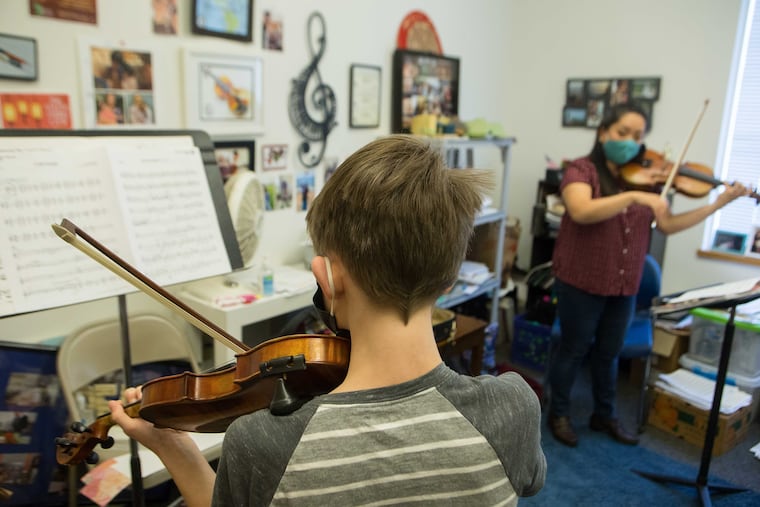She was a music lover who lived modestly and played the clarinet. She left the Music School of Delaware millions in her will.
The $10 million gift allows the community music school to increase scholarship funding eight-fold, but it is also being seen as a call to action to fill in gaps in aid.

Mary Ellen Northrop was a Wilmington music lover known to the Music School of Delaware, but not in particular as an active patron or supporter. The retired tax analyst is believed to have studied clarinet there at some point.
Several years ago Northrop began inquiring about giving a gift, but the school didn’t know if it was going to be “$1,000 stuffed under her mattress or something really significant,” says Kate M. Ransom, the school’s president and CEO.
Turns out it was significant.
Northrop, who died in June at age 78, left the school a bequest of $10 million for endowment — a very big deal for a group of the music school’s size.
“It was a shock, there’s no other word for it. It’s an order of magnitude larger than any gift we’ve previously received,” said Lawrence Hamermesh, a board member and past chair of the community music school, which traces its roots to 1924.
“She never told us any amount the gift might be, so the surprise was the scope and size of this trust fund,” said Ransom. “I was very glad I was sitting down when I read that line.”
Northrop’s gift, publicly announced by the school this week, comes with a series of conditions for how the money may be used, specifying that the investment income generated by the endowment each year fund scholarships. The nest egg it establishes is so large that it will enable the school to increase its scholarship money eight-fold to underwrite about 80 students each year.
Northrop also structured the gift in a way that the school sees as laying down a challenge. It stipulates that students receive aid only for two years. And so, with many students attending for six to eight years of training, the school is viewing Northrop’s gift as a call for the rest of the philanthropic community to step up with additional funding.
Northrop was described by several who knew her as smart, rather private, and a great lover of music. She lived modestly in Wilmington, said her lawyer, who was not aware of any substantial philanthropic donations she made prior to her death. She was also good at building her wealth.
“Mary Ellen Northrop was highly intelligent, a very sophisticated investor,” said trust lawyer Matthew P. D’Emilio.
Born in Westfield, N.Y., she was raised in Ripley, N.Y., where her family managed a large fruit, grape, and dairy operation, according to a death notice published in the News Journal in July. She received her master’s of library science degree from Rutgers in 1966, and worked as a librarian before earning an MBA from Wharton in 1976. She then became a budget analyst for General Electric and an income tax analyst for DuPont.
She suffered from severe scoliosis, and never married or had children, D’Emilio said. She was an avid amateur clarinetist and participated in her church music programs at Brandywine Valley Baptist Church and Faith Presbyterian Church, both in Wilmington.
Northrop’s bequest follows many of the contours of her life. Beyond the music school gift, she directed funds In her will to several other organizations: $4 million to the Wharton School; $3 million to the Scoliosis Research Society; $3 million to Our Daily Bread Ministries for its publications; $400,000 to Gideon International; and the residual amount of her estate — likely to be substantial — to the Salvation Army, D’Emilio said.
The gift to the Music School of Delaware has detailed stipulations for how it may be used. It is limited to children, between preschool and 12th grade, whose families have a net annual income of $150,000 or less. Students of public, private, or parochial schools qualify, but those attending charter schools do not. Scholarships are for full tuition up to $5,000 the first year, and 50% of lesson costs up to $5,000 the second year. Vocalists and all instrumentalists qualify, except for guitarists. The school serves 2,500 students, including adults, in several states through its two main branches, satellite locations, and programs in schools.
Ransom said she didn’t know if Northrop ever attended any performances at the Music School of Delaware, but several who knew her said she wove music into her life — even in unexpected ways.
“We were both attending a training session, and I remember being broken into groups for a skit,” said Charles W. Drury, Jr., who worked with Northrop at DuPont. “She volunteered to play a musical background and I was very impressed with how accomplished she was. It made our skit really stand out.”
“Music was very important to her, and she played clarinet solos in the church,” said Dennis Painter, another former DuPont coworker who attended the same church as Northrop. “She really enjoyed that and so did the congregation. She liked hymns and classical music. She was not a rocker.”
Neither Drury nor Painter was surprised that Northrop was generous. Just how generous she was able to be, though, struck both.
“I knew she was a good investor but didn’t know she was that well off,” said Painter. “Wow, that’s quite a sum.”
“That is an incredibly generous thing for her to have done,” said Drury. “It’s such a meaningful thing to help young people appreciate and develop their music skills.”
Said Hamermesh, from the school’s board: “There is a lot we can’t agree on these days, but I think music is something that nobody doesn’t like.”